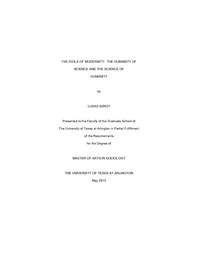
ATTENTION: The works hosted here are being migrated to a new repository that will consolidate resources, improve discoverability, and better show UTA's research impact on the global community. We will update authors as the migration progresses. Please see MavMatrix for more information.
Show simple item record
| dc.contributor.author | Szrot, Lukas | en_US |
| dc.date.accessioned | 2015-07-31T22:10:01Z | |
| dc.date.available | 2015-07-31T22:10:01Z | |
| dc.date.submitted | January 2015 | en_US |
| dc.identifier.other | DISS-13038 | en_US |
| dc.identifier.uri | http://hdl.handle.net/10106/25014 | |
| dc.description.abstract | The Idols of Modernity draws upon the work of early thinkers in the sociology of knowledge such as Karl Mannheim in an effort to delineate the history of--and unmask the ideology behind--many of the formative aspects of scientific knowledge that enjoy both a central and potentially controversial role in the twenty-first century. In touching upon the role of imagination and speculation in the `hardest' sciences, normative disputes between biological and social sciences, and the intellectual history of modern science, I attempt to reveal the humanity of science. In examining the democratization of the written word, the profound consequences of language as disciplinary gatekeeper, implications for the humanities and sciences of a methodologically pluralistic sociology, threats to human agency issued forth by the trend toward medicalizing deviance, and finally, the role of the intellectual in society and history, I probe the promise, and problems, faced by a science of humanity. | en_US |
| dc.description.sponsorship | Agger, Ben | en_US |
| dc.language.iso | en | en_US |
| dc.publisher | Sociology | en_US |
| dc.title | The Idols Of Modernity: The Humanity Of Science And The Science Of Humanity | en_US |
| dc.type | M.A. | en_US |
| dc.contributor.committeeChair | Agger, Ben | en_US |
| dc.degree.department | Sociology | en_US |
| dc.degree.discipline | Sociology | en_US |
| dc.degree.grantor | University of Texas at Arlington | en_US |
| dc.degree.level | masters | en_US |
| dc.degree.name | M.A. | en_US |
Files in this item
- Name:
- Szrot_uta_2502M_13038.pdf
- Size:
- 747.4Kb
- Format:
- PDF
This item appears in the following Collection(s)
Show simple item record


